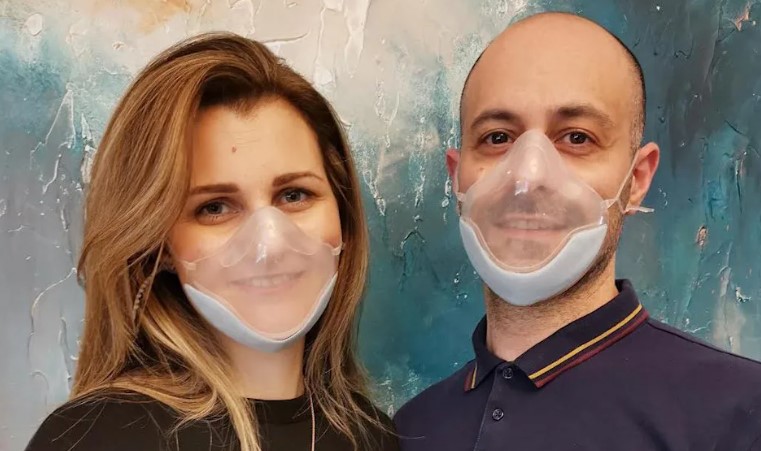Emma Sheppard
Tue, 22 February 2022, 4:44 am
yahoo!news
Dean Ezekiel reveals the personal story that inspired him to design transparent face coverings – and how a university’s input and support helped him make sustainability a priority
Face masks have been an essential part of limiting the spread of Covid-19. But for many people who are deaf or hearing-impaired, the coverings have left them isolated from society. When Dean Ezekiel’s wife Aimee, who is partially deaf, attended a pregnancy scan during the first lockdown, she was distraught to find she had no way to determine what the doctor was saying. “Because he was wearing a mask, she couldn’t read his lips. She felt helpless without the use of basic communication,” says Ezekiel.
It was that experience that inspired the entrepreneur to start Design Abled and develop Helloface, a transparent, recyclable face mask, which is compatible with facial recognition technology. The startup was recently recognised for its sustainability credentials, winning the microbusiness category at the Heroes of Net Zero competition at Cop26.
Designed in the UK, Ezekiel’s team has worked closely with the Jewish Deaf Association to run focus groups and iterate the design based on user feedback. “The stories about what people are going through are quite heartbreaking,” says Ezekiel, emphasising that in medical care settings, some of the strongest, most confident and successful people in our community can automatically become the most vulnerable.
“There are people in hospital beds who can’t tell the nurses that they need to go to the toilet. There are deaf children at school who can’t understand their teachers. And others, like Aimee, who attend medical appointments they can’t participate in,” says Ezekiel.
According to government statistics, there are 11 million people in the UK who are deaf or hearing-impaired. Only 87,000 of those know British sign language. Many will instead rely on lip reading and other facial cues to communicate. Research by the charity SignHealth discovered that 74% of deaf people have found it more difficult to access healthcare during the pandemic, and 62% say face masks have been one of the biggest issues related to this. One in three say Covid-19 has had a major negative impact on their mental health.
When the pandemic hit, Ezekiel was running the travel company Upgrade, which he’d founded as part of the University of Hertfordshire’s Business Incubator programme. With flights grounded, the university encouraged him to think about other business ideas and pitch them to the group. “I had a few ideas but this was the one that was closest to my heart,” he says.
As well as providing office space, marketing and legal advice, and tender writing assistance, the Enterprise Hub Business Incubator and University Enterprise Zone programmes also gave him access to nanotechnology, chemical and material experts from the university, and a specialist pre-compliance certification testing lab.
Yanina Aubrey is the head of business growth and entrepreneurship at the University of Hertfordshire. Her team supports between 350 and 400 businesses across a variety of programmes at any one time, from sectors as diverse as manufacturing, the creative industries, hospitality and healthcare.
During the pandemic, her team, along with the Hertfordshire Local Enterprise Partnership and the Hertfordshire Growth Hub, launched a volunteer business support scheme, recruiting more than 75 volunteer mentors from the local business community, as well as from within the university’s own business school, to provide advice to SMEs. “It was an incredibly positive experience,” says Aubrey. “Businesses had been desperate for support – they were calling the local growth hub and our own Enterprise Hub and there just weren’t enough hours in the day to answer all of their queries.” The scheme ended up supporting more than 325 local businesses during this difficult period.
After more than a year of development, Helloface has released two types of certified masks that will soon be ready for distribution – the transparent medical mask and the P3 half-mask respirator. So far, says Ezekiel, there has been interest from NHS trusts, care homes and social care settings, as well as teachers, childcare providers, and those who work in noisy environments such as factories or building sites. “We’re focusing on healthcare settings first. But ultimately, we want to make sure that anyone who wants them can have them,” he says.
Being environmentally friendly has also been a priority. A multidisciplinary group of researchers estimates that if every person in the UK used a single-use mask each day for a year, it would create 66,000 tonnes of contaminated plastic waste. “The materials we use are 100% recyclable, and we partner with local recycling centres so the material is ground down and brought back in pellet form to be reused in production,” says Ezekiel.
Encouraging entrepreneurs to think about sustainability is a core focus for the University of Hertfordshire’s Enterprise Hub team, too. “We don’t just want to help businesses grow, we want to help them grow sustainably – and by that we mean sustainability in its broadest sense, including environmental and social factors,” says Aubrey. Sustainability considerations are discussed in the 12-month Incubator Programme, and the university is launching a new 15-week Sustainability Accelerator Programme, funded by the UK government’s Community Renewal Fund, and focused wholly on the development of sustainable products, services or technologies.
Aubrey has noticed a shift in how entrepreneurs prioritise sustainability, particularly after Cop26. “Nobody really questions the need to be talking about sustainability today. But businesses still need more training and support. There is a lot of confusion around some of the terminology and it can sometimes feel overwhelming. Sustainability should be part of every entrepreneurial conversation right from the outset, when entrepreneurs are thinking about their concept, their value proposition, their purpose.”
For the Helloface team, it was a no-brainer. “We could have done things much easier, much quicker, but we would have created a product that would end up in landfill,” says Ezekiel. “We want to solve a current problem without creating a future problem.”
Source: uk.news.yahoo.com/face-mask-allows-deaf-people-094432844.html





